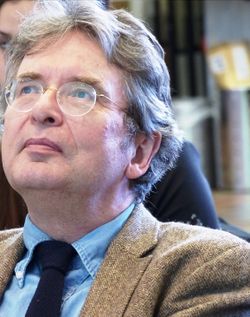Adalbert Evers
Dr. Adalbert Evers is one of the pioneers of civil society and third sector studies. He was born April 9, 1948 in Paderborn, Germany. He is professor emeritus at the Justus Liebig University in Giessen, where previously he was Professor for Comparative Health and Social Policy. Since 2014 he has worked as Senior Fellow at the Centre for Social Investment and Innovation (CSI), Max-Weber-Institut für Soziologie, Heidelberg University. He is affiliated with the Ersta Sköndal University College, Stockholm, where he is Guest Professor since 2016. He lives with his wife in Gießen, a small university town north of Frankfurt am Main.
Academic credentials
In 1988, Dr. Evers did his Habilitation for Political Sociology at the Johann Wolfgang Goethe University in Frankfurt; His subject was “Über den Umgang mit Unsicherheit. Die Entdeckung der Gestaltbarkeit von Gesellschaft” (Coping with uncertainty. Uncovering how to shape society). In 1977 he did his doctoral thesis in Political Sciences at the University of Bremen (Germany). He received his Diploma in Architecture and Urban Planning at the Technical University Aachen ( Germany) in 1973.
Research and Teaching
Dr. Evers' research and teaching interests have been concentrated in five related areas: (a) welfare politics and social policies in comparative perspective; (b) social services and social innovation; (c) civil society and third sector organisations; (d) civic engagement and volunteering; (e) public governance. The key concern, that binds these themes throughout together is the interaction of the forces of the state, markets, civil society and the family and community sphere - arrangements, that help to empower people, strengthening welfare and the civic roots of democracy. His research has been on respective concepts and development of social policy in “welfare mixes” and hybrid organisations, by intertwining the positive sides of civil, state, market and community forces; concepts, he helped to develop in the 1980s and 1990s. Later on, in the last decade, his research was on personal social services as a field for new forms of “co-production” that empower users, and on respective “social innovations” that may be encouraged by politics of a democratic experimentalism. Throughout, the focus of his research has been on potentials of civil society, associations and movements and the possibilities to unfold them in respective forms of welfare and participative democratic governance. (see the selective list of publications dealing with these key issues at the Bibliography link above).
Professional experience
From 2016 – 2017 Adalbert Evers has been Guest Professor at the Ersta Sköndal University College, Stockholm. worked during 2014 on invitation as Distinguished Research Fellow at the Institute for Advanced Studies, University of Birmingham (UK); 2013 – 2016 he served as Member of the Expert Commission working out the Second Report on Civic Engagement for the Federal Government of Germany; 2012 – 2020 he was Speaker of the working group on civil society research in the BBE, Bundesnetzwerk Bürgerschaftliches Engagement (Federal Network on Civic Engagement); from 2002- 2008 Speaker of the Directory of the Section for Social Policy in the German Sociological Association; from 1996 – 2001 he had a five year appointment as one of the Directors of the Institut für Sozialforschung (IfS) at the Johann Wolfgang Goethe Universität in Frankfurt; before his professorship at Giessen University (1993-2013) and after his first appointment as Lecturer at the Institute for Planning Theory at the Technical University in Aachen, he worked from 1983 – 1993 as Researcher and Director of the Unit for Elderly Care Policies and Services at the European Centre for Social Welfare Policy and Research (EC) in Vienna
Consultancies
- United Nations Office in Vienna, Austria
- European Centre for Social Welfare Policy and Research (Vienna)
- German Ministry for Family, Youth and the Elderly
- Bertelsmann Foundation; the Deutscher Verein für öffentliche und private Fürsorge (joint umbrella organisation of German national welfare agencies and municipalities)
- the BBE Bundesnetzwerk Bürgerschaftliches Engagement (Federal Network for Civic Engagement in Germany)
Major international research projects (since 2000)
• Welfare Innovations on the Local Level in favour of Cohesion (WILCO), supported by the 7. Framework Program of the EU (2010 – 2013)
• Civil Society and New Forms of Governance in Europe (CINEFOGO), Network of Excellence, supported by the 6. Framework Program of the EU (2005 - 2009)
• Changing Family Structures and Social Policy: Childcare Services as Sources of Social Cohesion, supported by the 5. Framework Program of the EU (2001 – 2004)
• The Socioeconomic Performance of Social Enterprises in the Field of Integration by Work, supported by the 5. Framework Program of the EU (2001 – 2004)
• The Policies of Social Integration in Europe. Systems of Collective Action, supported by the 4. Framework Program of the EU (1998 – 2001)
